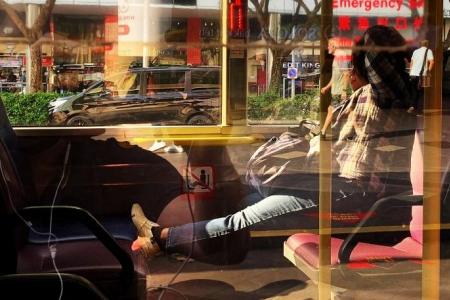Why do inconsiderate passengers behave this way, and how can we deal with them?
Irritated by commuters who push their way into MRT trains before others alight, Ms Sophia Castro, 20, would usually give them the stink eye in the hopes of making them feel embarrassed.
The diploma student told The Sunday Times that she prefers not to confront them, as she wants to avoid conflicts.
From ST’s interviews on the ground last week, many passengers cited conflict avoidance as their main reason for keeping quiet about other commuters’ inconsiderate acts.
Ms Michelle Tay, director of programmes and operations at the Singapore Kindness Movement, said commuters can approach inconsiderate passengers calmly and kindly.
If they do not have the courage to do so, they can consider asking fellow passengers for help.
She advised speaking to the inconsiderate passenger politely, using simple phrases, such as: “Hello, sir or madam, could you please put your legs down so that others can take a seat? Thank you.”
She proposed ending these conversations with a smile to lighten the mood.
Bus operator Go-Ahead Singapore encourages commuters to ask bus drivers for help if they are affected by the behaviour of others on board.
Bus drivers are trained to handle such matters appropriately and know when to take further action if necessary, said the operator.
The kindness movement’s Ms Tay said the first step is not to shame these passengers, but to discourage their bad behaviour.
Additionally, passengers should continue encouraging acts of kindness if they witness these.
“A simple smile or thumbs up could help brighten the person’s day,” added Ms Tay.
Psychologists who spoke to ST said many troublemakers are unaware of the impact their actions may have on others.
Dr Cha Yeow Siah, a senior psychology lecturer at the National University of Singapore (NUS), said most people do not spend enough time examining themselves.
This translates into a lack of self-awareness, especially if these behaviours are accepted or commonly practised by their friends and family, he added.
Dr Jean Liu, an adjunct assistant professor of psychology at Yale-NUS College and NUS Yong Loo Lin School of Medicine, shares the view that inconsiderate behaviour can be unintentional, due to limited awareness of one’s surroundings and different expectations of socially acceptable behaviour.
In some cases, commuters behave inconsiderately when they think no one else has noticed them on crowded trains or buses.
Giving people the benefit of the doubt – instead of blaming them immediately – is essential, as their inconsiderate actions may be accidental or have arisen from difficult circumstances, Dr Liu said.
She added that most people would adjust their problematic behaviour when approached.
“Instead of focusing on policing the bad behaviour of others, we can focus on performing the behaviours we’d like to see… to change the norm of what is acceptable.”
Get The New Paper on your phone with the free TNP app. Download from the Apple App Store or Google Play Store now


